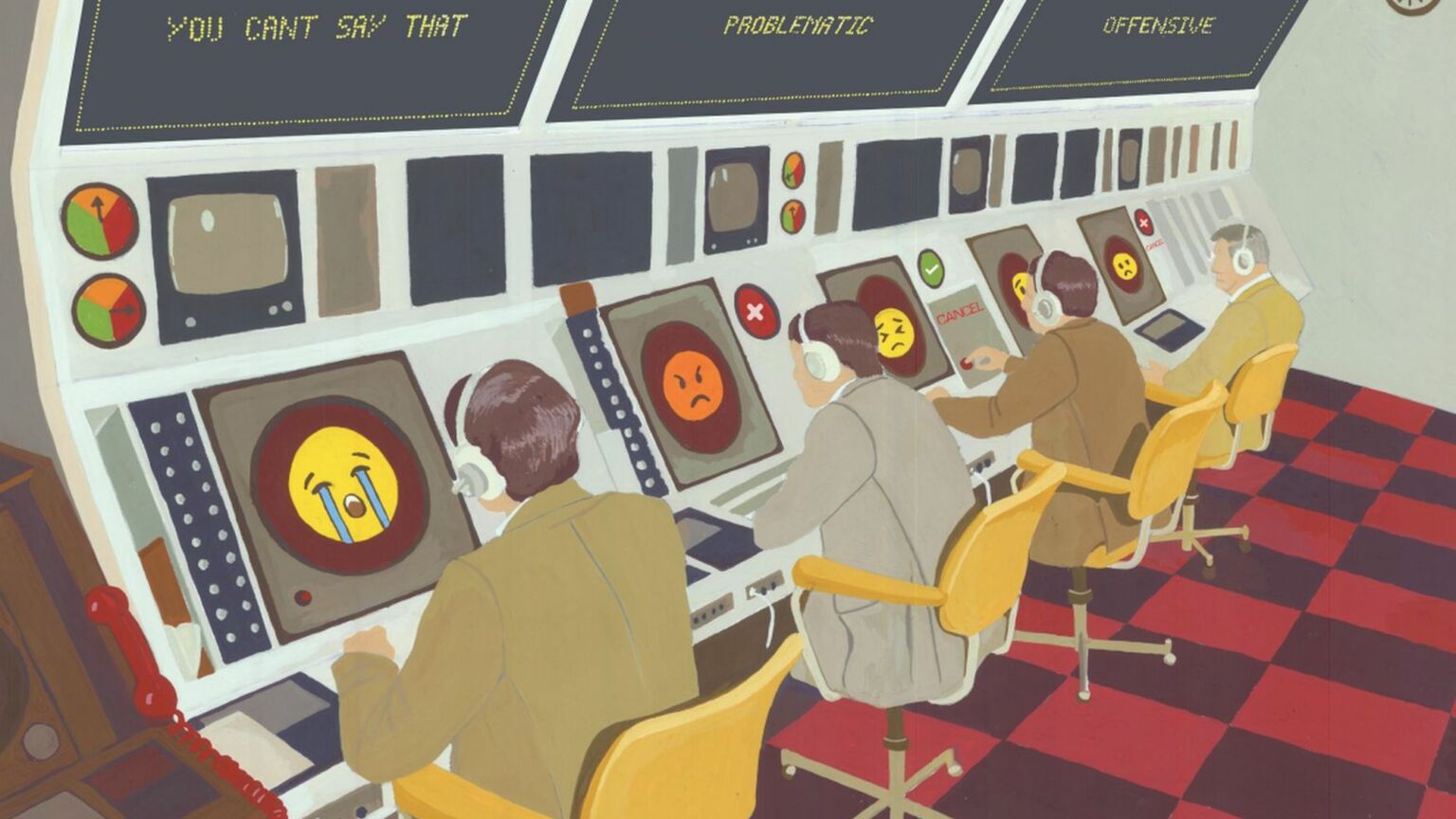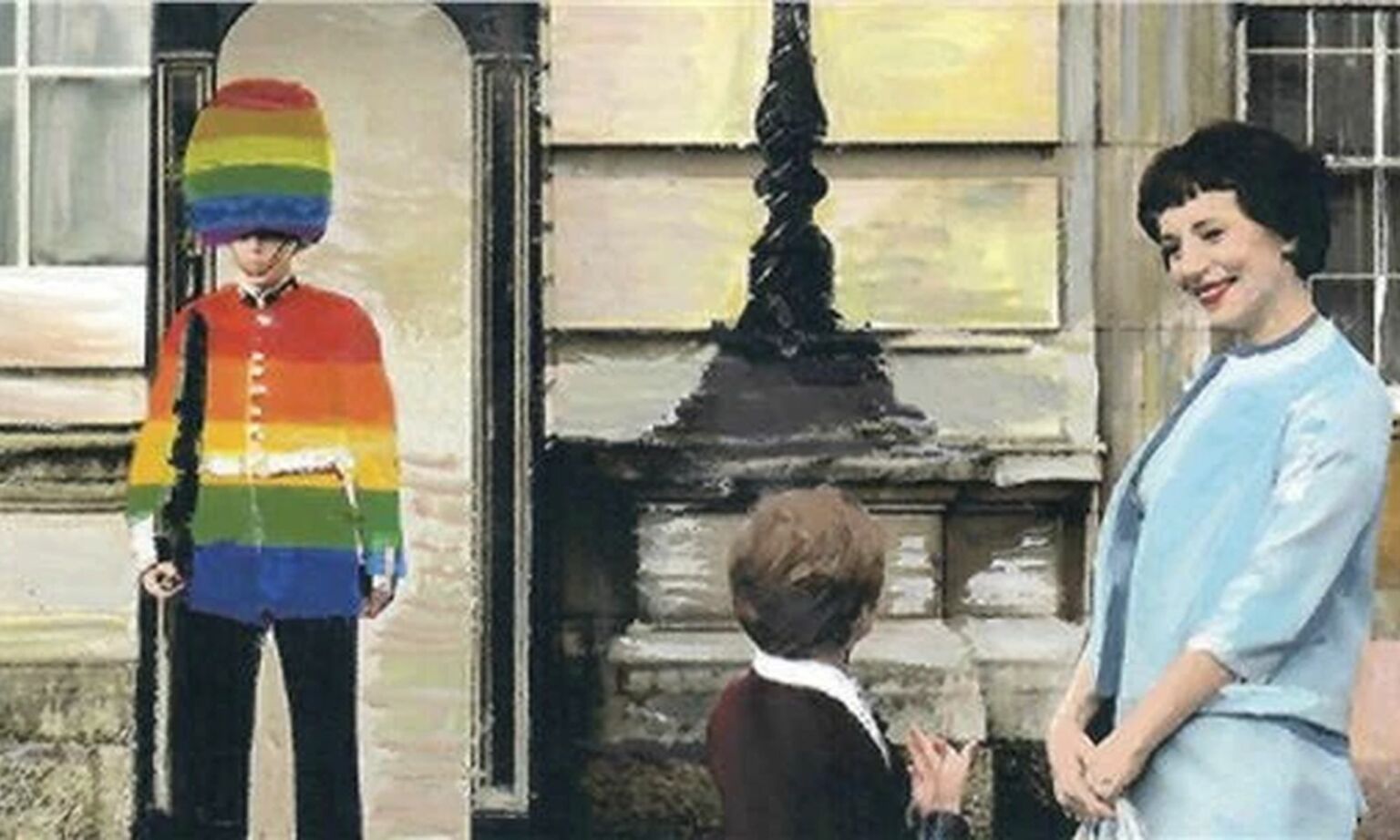‘Satire is the enemy of tyranny’
Artist Miriam Elia on resisting the New Normal and the power of humour.

The past few years have felt borderline dystopian. Covid lockdowns emptied cities and forced us apart from friends and family. Woke fervour has exploded on to the streets and has captured our institutions. We are constantly bombarded with propaganda telling us that normal, everyday views and behaviour are either racist or transphobic – or are a threat to the climate or public health. But despite the strangeness of this New Normal, there have been very few artists or satirists willing to really question any of it. Indeed, most of the artworld appears to be very much on side with this new regime.
One notable exception is British artist Miriam Elia. Her past work has taken aim at everything from conceptual art to Islamism. Now her latest exhibition, The New Normal, holds a mirror up to the irrationality of life during and after the pandemic. spiked caught up with Elia to find out more about her work.
spiked: What do you understand as the New Normal? What characterises it?
Miriam Elia: I think that’s the question we’re all asking. The exhibition was inspired by all the work I produced during the Covid lockdowns. I was especially interested in the rhetoric the government came out with about redefining normality. I knew intrinsically that it wasn’t normal at all. The public had developed this strange relationship with authority where they agreed to lock themselves in their houses for two years because scientists told them to. I wanted to question that.
The phrase New Normal was also used globally. Almost every country had this endless rhetoric about how what they were doing was completely fine. I was obviously very sceptical of that and it fed into my work.
The exhibition doesn’t just dwell on Covid, though. It includes the entire philosophy that has suddenly sprung up around identity politics. I thought the title reflected everything that I tried to record for the past three years and the sense of unease I had. Because it’s not normal.
The exhibition contains a lot of the original illustrations that were painted for We Do Lockdown, which became a very successful book. It is a part of my Dung Beetle series, which started with We Go to the Gallery, a Ladybird Book-style satire on contemporary art.
There’s also a series of prints in the style of 1950s and 1960s educational wall charts. Schools used to have them in classrooms to show normal, everyday scenes – maybe the seaside or the city or the train station – to help kids learn. I just thought these were the perfect medium to create my paintings and show the abnormal being portrayed as normal. That’s the theme that runs through all my work at the moment.
I felt an incredible creative output over the lockdown period. I was one of the few artists to really try to record what was going on and to interpret it with a sense of humour. And if people laugh, it means I’ve communicated something that resonates.
If people weren’t laughing at or responding to my work, then I would maybe be this pariah voice. It seems to me, though, that a lot of these ideas are just pushed through institutions and bureaucracies. Everyone is too scared to question them, almost like it’s a religion.

spiked: Why do you think you’re able to question these ideas from an outside perspective?
Elia: I grew up with a lot of different influences. I have a Jewish-Arab father, who is an Arab speaker and is culturally Arabic. And I have an Ashkenazi Jewish mother, whose brother was a very famous punk and trans icon. I was regularly taken to synagogue and went to a Jewish school. At the same time, after synagogue we would go to some art gallery or concert where we’d see the most outrageous things. It was always very creative and inspiring. I was really into modernism and Bauhaus and all those leftist movements. I grew up in Muswell Hill, the home of the liberal intelligentsia who are now running the show.
In retrospect, these different influences gave me some clarity. I can understand different ways of thinking because I’ve delved in and out of different worlds. I also realised that what it boils down to is two very different spiritual worldviews. One has to do with the collective – we women, we trans people, we working-class people. And the other is to do with the individual.
Orthodox Judaism is really about addressing the soul and the individual. You are responsible for your own life. The collectivist worldview is more about groups competing with each other. One is almost the antithesis of the other. I use those two worlds as a way of mirroring each other and as a way of drawing out comedy. And that makes people laugh.
spiked: Would you say that satire is especially important today?
Elia: Humour is the most powerful way of communicating something serious. If you can laugh at something, you can belittle it. I think all kinds of tyrannies and ideologies don’t like humour. Satire makes people uncomfortable, but that’s a good thing.
I realised very early that I couldn’t just stand up and say what I thought, because people would just cancel me or say that I was this-or-that-phobic. So through holding up a mirror, I’m able to make people laugh at themselves and that’s the most important thing.
As a satirist, you’re supposed to hold a mirror up to things. I’m not necessarily judging anyone or anything. I try to be as neutral as possible. I think the skill is to not moralise or talk down to people. You have to understand everyone’s point of view, but you also have to make them reassess their own logic. If you just say ‘I think you’re wrong’, people won’t respond well to that. Holding a mirror up to their behaviour is way more powerful.
Miriam Elia was talking to Lauren Smith.
Miriam Elia’s The New Normal is at the Ujazdowski Castle Centre for Contemporary Art, Warsaw until 11 June.
Pictures by: Miriam Elia.
To enquire about republishing spiked’s content, a right to reply or to request a correction, please contact the managing editor, Viv Regan.








Comments
Want to join the conversation?
Only spiked supporters and patrons, who donate regularly to us, can comment on our articles.